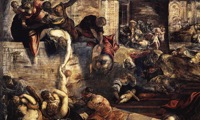Difference between revisions of "Massacre"
(Created page with 'File:lighterstill.jpgright|frame ==Origin== Middle French, French ''massacre'' massacre, butchery *[http://en.wikipedia.org/wiki/16th_cent...') |
m (Text replacement - "http://" to "https://") |
||
| (One intermediate revision by one other user not shown) | |||
| Line 3: | Line 3: | ||
==Origin== | ==Origin== | ||
Middle French, French ''massacre'' massacre, butchery | Middle French, French ''massacre'' massacre, butchery | ||
| − | *[ | + | *[https://en.wikipedia.org/wiki/16th_century 1578] |
the first usage of which was "1588 J. PENRY Viewe Publ. Wants Wales 65 Men which make no [[conscience]] for gaine sake, to break the [[law]] of the æternall, and massaker soules...are dangerous subjects". | the first usage of which was "1588 J. PENRY Viewe Publ. Wants Wales 65 Men which make no [[conscience]] for gaine sake, to break the [[law]] of the æternall, and massaker soules...are dangerous subjects". | ||
==Definitions== | ==Definitions== | ||
| Line 13: | Line 13: | ||
A '''massacre''' is an [[incident]] where some [[group]] is killed by another, and the perpetrating party are [[perceived]] to be in total [[control]] of [[force]] while the [[victimized]] party is perceived to be helpless and/or [[innocent]] with regard to any legitimate [[offense]]. There is no clear-cut [[definition]] for when killings are referred to as massacres or not, rather, this choice is a result of an [[individual]] or [[collective]] assessment, depending e.g. on how the circumstances of the killing align with given [[ideas]] of acceptable use of [[force]] and on the desired status of an event in collective [[memory]]. | A '''massacre''' is an [[incident]] where some [[group]] is killed by another, and the perpetrating party are [[perceived]] to be in total [[control]] of [[force]] while the [[victimized]] party is perceived to be helpless and/or [[innocent]] with regard to any legitimate [[offense]]. There is no clear-cut [[definition]] for when killings are referred to as massacres or not, rather, this choice is a result of an [[individual]] or [[collective]] assessment, depending e.g. on how the circumstances of the killing align with given [[ideas]] of acceptable use of [[force]] and on the desired status of an event in collective [[memory]]. | ||
| − | The term massacre derives from the Latin term for mass sacrifice. The first recorded use in English of the word massacre in the name of an event is "[ | + | The term massacre derives from the Latin term for mass sacrifice. The first recorded use in English of the word massacre in the name of an event is "[https://en.wikipedia.org/wiki/Christopher_Marlowe Marlowe] (c1600), The massacre at Paris" (a reference to the [https://en.wikipedia.org/wiki/St._Bartholomew%27s_Day_massacre St. Bartholomew's Day massacre]). Massacre can also be used as a verb, as "To kill (people or, less commonly, [[animals]]) in numbers, esp. brutally and indiscriminately". |
[[Category: Law]] | [[Category: Law]] | ||
Latest revision as of 01:22, 13 December 2020
Origin
Middle French, French massacre massacre, butchery
the first usage of which was "1588 J. PENRY Viewe Publ. Wants Wales 65 Men which make no conscience for gaine sake, to break the law of the æternall, and massaker soules...are dangerous subjects".
Definitions
- 1: the act or an instance of killing a number of usually helpless or unresisting human beings under circumstances of atrocity or cruelty
- 2: a cruel or wanton murder
- 3: a wholesale slaughter of animals
- 4: an act of complete destruction <the author's massacre of traditional federalist presuppositions
Description
A massacre is an incident where some group is killed by another, and the perpetrating party are perceived to be in total control of force while the victimized party is perceived to be helpless and/or innocent with regard to any legitimate offense. There is no clear-cut definition for when killings are referred to as massacres or not, rather, this choice is a result of an individual or collective assessment, depending e.g. on how the circumstances of the killing align with given ideas of acceptable use of force and on the desired status of an event in collective memory.
The term massacre derives from the Latin term for mass sacrifice. The first recorded use in English of the word massacre in the name of an event is "Marlowe (c1600), The massacre at Paris" (a reference to the St. Bartholomew's Day massacre). Massacre can also be used as a verb, as "To kill (people or, less commonly, animals) in numbers, esp. brutally and indiscriminately".
